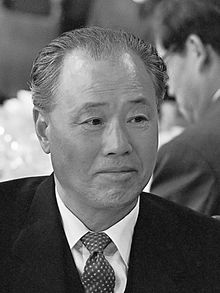

General Secretary of the Communist Party of China
Zhao Xiuye 17 October 1919 Hua County, Henan, Republic of China
17 January 2005(2005-01-17) (85) Beijing, People's Republic of China
15 January 1987 – 24 June 1989 Acting: 15 January 1987 – 1 November 1987
Former General Secretary of the Chinese Communist Party In this Chinese name, the family name is Zhao. Zhao Ziyang 赵紫阳 Zhao Ziyang in 1985.General Secretary of the Communist Party of ChinaIn office 15 January 1987 – 24 June 1989 Acting: 15 January 1987 – 1 November 1987 Preceded by Hu YaobangSucceeded by Jiang ZeminPremier of the People's Republic of ChinaIn office 10 September 1980 – 24 November 1987PresidentLi Xiannian (since 1983)Deputy See list Wan Li Yao Yilin Li Peng Tian Jiyun Qiao Shi LeaderDeng XiaopingPreceded by Hua GuofengSucceeded by Li PengVice Chairman of the Chinese People's Political Consultative ConferenceIn office 8 March 1978 – 17 June 1983ChairmanDeng XiaopingSecretary GeneralLiu LantaoVice Chairman of the Communist Party of ChinaIn office 29 June 1981 – 12 September 1982Serving with Ye Jianying Deng Xiaoping Li Xiannian Chen Yun Hua GuofengChairmanHu YaobangFirst Vice Chairman of the Central Military CommissionIn office 1 November 1987 – 23 June 1989Serving with Yang ShangkunChairmanDeng XiaopingSecretary-GeneralYang Shangkun Personal detailsBornZhao Xiuye (1919-10-17 ) 17 October 1919 Hua County, Henan, Republic of ChinaDied17 January 2005(2005-01-17) (aged 85) Beijing, People's Republic of ChinaResting placeChangping District, BeijingNationalityChinesePolitical partyCommunist Party of China (1938–2005)Spouse(s)Liang Boqi (m. 1944)Children5 sons, 1 daughterSignature Central institution membership 1987–1989: 13th Central Military Commission 1980–1989: 11th, 12th, 13th Politburo Standing Committee 1979–1989: 11th, 12th, 13th Politburo 1972–1989: 9th, 10th, 11th, 12th, 13th Central Committee ?–1989: 7th National People's Congress Other offices held 1987–1989: Vice Chairman, State Central Military Commission 1987–1989: Vice Chairman, Party Central Military Commission 1981–1982: Vice Chairman, Central Committee 1980–1989: Leader, Leading Group for Financial and Economic Affairs 1975–1980: Governor, Sichuan Province 1975–1980: Party Committee Secretary, Sichuan Province 1974–1975: Governor, Guangdong Province 1974–1975: Party Committee Secretary, Guangdong Province 1965–1967: Party Committee Secretary, Guangdong Province Zhao Ziyang"Zhao Ziyang" in Simplified (top) and Traditional (bottom) Chinese charactersSimplified Chinese赵紫阳 Traditional Chinese趙紫陽 TranscriptionsStandard MandarinHanyu PinyinZhào Zǐyáng Wade–GilesChao4 Tzu3-yang2 IPA Yue: CantoneseJyutpingZiu6 Zi2-joeng4 IPA Southern MinHokkien POJTiō Chí-iông Zhao XiuyeSimplified Chinese赵修业 Traditional Chinese趙修業 TranscriptionsStandard MandarinHanyu PinyinZhào Xiūyè Zhao Ziyang (Chinese: 赵紫阳 ; pronounced , 17 October 1919 – 17 January 2005) was a high-ranking politician in the People's Republic of China (PRC). He was the third premier of the People's Republic of China from 1980 to 1987, vice chairman of the Communist Party of China from 1981 to 1982, and general secretary of the Communist Party of China from 1987 to 1989. He was in charge of the political reforms in China from 1986, but lost power in connection with the reformative neoauthoritarianism current and his support of the Tiananmen Square protests of 1989. As a senior government official, Zhao was critical of Maoist policies and instrumental in implementing free-market reforms, first in Sichuan and subsequently nationwide. He emerged on the national scene due to support from Deng Xiaoping after the Cultural Revolution. An advocate of the privatization of state-owned enterprises, the separation of the party and the state, and general market economy reforms, he sought measures to streamline China's bureaucracy and fight corruption, issues that challenged the party's legitimacy in the 1980s. Many of these views were shared by the then General Secretary Hu Yaobang. His economic reform policies and sympathies with student demonstrators during the Tiananmen Square protests of 1989 placed him at odds with some members of the party leadership, including Chairman of the Central Advisory Commission, Chen Yun, Chairman of the CPPCC, Li Xiannian, and Premier Li Peng. Zhao also began to lose favor with Deng Xiaoping, who was the Chairman of the Central Military Commission. In the aftermath of the events, Zhao was purged politically and effectively placed under house arrest for the rest of his life. He died from a stroke in Beijing in January 2005. Because of his political fall from grace, he was not given the funeral rites generally accorded to senior Chinese officials. His secret memoirs were smuggled out and published in English and in Chinese in 2009, but the details of his life remain censored in China.

We use cookies
We use cookies and other tracking technologies to improve your browsing experience on our website, to show you personalized content and targeted ads, to analyze our website traffic, and to understand where our visitors are coming from. Privacy Policy.